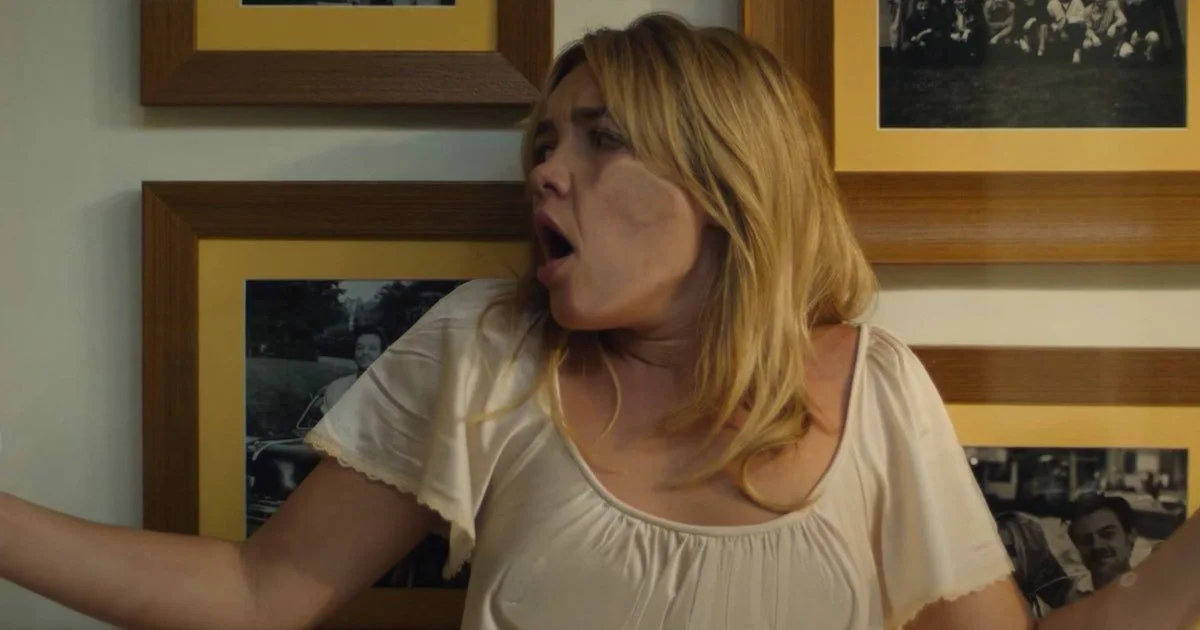‘Don’t Worry Darling’ Review: Perfection Comes at a Price
‘Picture Perfect’: Florence Pugh in Don’t Worry Darling
Oliva Wilde’s follow-up to her much successful directorial debut Booksmart shows us a 1950s daydream through rose-tinted glasses, though we soon find there’s more to this suburban paradise than meets the eye. If your Stepford alarm bells are ringing here, then you’re right on the money.
Utopia, it seems, has arrived in all its kitschy-poodle skirt glory. In the idealistic desert town of Victory, everything’s coming up roses for newlyweds Alice (Florence Pugh) and her husband, Jack (Harry styles). This candy-coloured town is populated by young couples and their families, who adhere to a strict routine. The men go off to work in the mornings, waved off by their adoring wives, whilst the women stay home shopping, drinking Aperol and cooking roast beef. There’s just one golden rule, don’t leave the compound.
The saying ‘all publicity is good publicity’ springs to mind here, which seems to have been proven true after the barrage of bad press Wilde has gotten in the lead-up to the release of Don’t worry Darling. The movie has succeeded in making $79.6m in box offices, with people flooding to the cinemas come September 23rd, only to leave disappointed after 123 minutes of overly-stylised, overly-saturated drivel. The film finds inspiration from movies such as Ira Levin’s The Stepford Wives (who’d’ve guessed), as well as classics like The Matrix and The Truman show - the creative setup is there but instead of refreshing innovation we find ourselves jumping from one genre cliches to another. Wilde favours surface and style over substance, most likely as a distraction from the story, which is perforated with plot holes and gaping inconsistencies.
After a disturbing altercation with another housewife – Margret (Kiki Layne), Alice finds herself through the looking glass, now unsatisfied with her picture-perfect life and distrustful of Jack. However just as the discord builds and Alice seems to gain a single iota of independent thought, the movie stalls. Wilde begins to dabble with visual motifs such as the ‘circle’, which returns again and again to haunt Alice. In fact, it returns with such an alarming frequency that it loses its relevancy, becoming an unintended metaphor for the movie's circular narrative.
Florence Pugh is one of the most promising young actresses on the scene at the moment and the obvious shining star of the film is her performance as Alice. Pugh strives to provide personality, fire, and passion to an otherwise two-dimensional role, rising and encompassing Alice’s air-headed persona, quite literally carrying the film on her shoulders. Wilde’s narrative weaknesses prove difficult for the actors to navigate, such is obvious in Styles’ performance, as a relative newcomer, who struggles to deliver complexity to his character.
Don’t Worry Darling struggles with complexity period. Its take on feminism is clumsy and obvious, a point to everyone who watches and learns that sexism is bad. The concept of the trapped housewife in the prison of her traditional feminine role has been woefully scrutinized to death and in the 21st century needs to give rise to new feminist discourse. However, what gets overlooked is the character Jack and his representation of Incel culture. Incel or Involuntarily celibate, refers to an online subsection of men perpetuation misogynistic, anti-feminist attitudes, often favouring more traditional attitudes towards gender and relationships. Conversations online via chats such as Reddit perpetuate the idea of inevitable male loneliness in a 21st-century society, which drives individuals to become increasingly frustrated and over time, this ‘manosphere’ has come to exhibit increasingly violent and hostile views towards women. The comparison is a clear one, that with more structure and focus could have proven an interesting window of current social subculture to explore.

